

Qadir Bakhsh Baloch, a local fisherman in Gwadar, set out to fish at 8 a.m. with five companions and returned about six hours later with 20 kilograms of fish. But according to him, after all that effort, "only 300 to 400 rupees" remain as profit. The 35-year-old fisherman was at Dimi Zar beach in the coastal city of Gwadar, in Pakistan's Balochistan province, where he that the total price of 20 kilograms of small fish would be around 4,000 rupees, but after deducting fuel costs and dividing the remainder among seven people, "we’ll barely be left with 300 to 400 rupees." One major reason behind this complaint is the situation arising from the ongoing Iran-Israel conflict and its economic impact. But how does this Middle East war affect Qadir Bakhsh’s livelihood? He explained, “We use 12 liters of petrol per fishing trip. Because of the war, fuel is currently being sold at 220 rupees per liter. If fuel were cheaper, we could make more profit.” It’s worth noting that following the outbreak of the Iran-Israel war, Pakistan-Iran border closures reduced the supply of Iranian fuel across Balochistan, including Gwadar, which drove up local fuel prices and further strained the region’s fishing economy. Deputy Commissioner of Gwadar, Hamood ur Rehman, stated that “residents rely on Iran for food supplies, fuel, and LPG,” but he also claimed that “there is no shortage of these items.” According to him, “some people are creating an artificial crisis to take advantage of the situation.” In Gwadar, we observed that the only government PSO fuel station in the city was selling petrol at 267 rupees per liter, while Iranian petrol in the same area was available at prices ranging from 180 to 220 rupees per liter. In Turbat, the rate ranged between 190 and 200 rupees per liter.
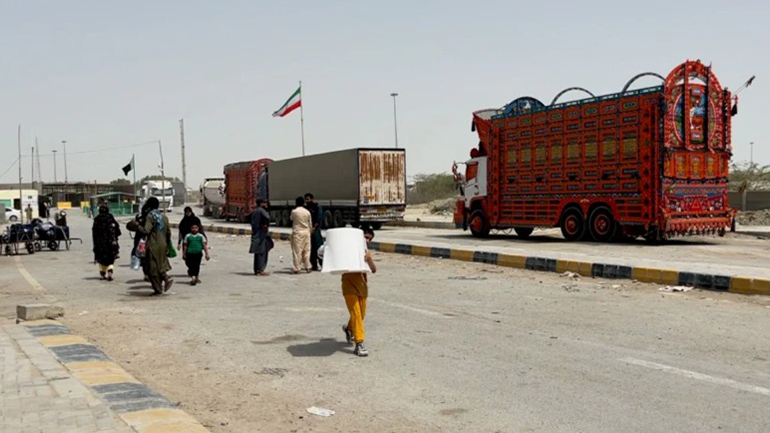
Pakistan and Iran closed their borders after the start of the Iran-Israel war.
In July last year, Pakistan Army spokesperson Lieutenant General Ahmed Sharif Chaudhry stated during a press conference that efforts were being made to tighten security along the country’s more than 900-kilometer-long border with Iran to curb fuel smuggling. He said that “thanks to joint efforts by the Army, Frontier Corps, and intelligence agencies, daily fuel smuggling had been reduced from 15 million liters to five to six million liters.” It is evident that a significant part of Balochistan, which depends heavily on goods — especially fuel — imported from Iran, has been impacted by the ongoing conflict. Balochistan’s dependency on Iranian imports and how ordinary people have been affected in recent days.
Whether it’s a war-like situation in Iran or diplomatic tensions between Pakistan and Iran, the impact is most deeply felt in Balochistan’s Makran and Rakhshan Divisions. The livelihoods of people in these areas are tightly linked to cross-border trade, and whenever the border has been closed in the past, protests have erupted from Gwadar to Taftan, often uniting political and religious parties on the same page. According to the Gwadar Fishermen’s Alliance, around 40,000 fishermen in Gwadar alone rely on small boats, launches, and speedboats to fish in the sea. These fishermen were already troubled by large trawlers depleting fish stocks in deeper waters, but now rising fuel prices have added a new burden. Alliance leader Younus Anwar, pointing to the idle boats on Padi Zar Beach, said: "Fishermen aren’t going out to sea right now because there’s no guarantee of catching anything. They don’t want to burn fuel and take the risk." "Each boat consumes between 20 to 70 liters of fuel, depending on how far it travels for the catch. Many fishermen are now in debt to boat owners, owing between 50,000 to 100,000 rupees, mainly due to fuel costs," he added. Veteran community leader Rasul Bakhsh Baloch emphasized, "If the supply of Iranian fuel stops, there is no system in place for Pakistani oil companies to meet the demand here, nor is there any subsidy for fishermen." It's not just fuel — other fishing essentials are also imported from Iran. While fishermen in Gwadar once used wooden boats, now fiber boats, locally known as Kayaks, are widely used — and they, too, are imported from Iran. The engines and spare parts for these boats are also sourced from across the border.
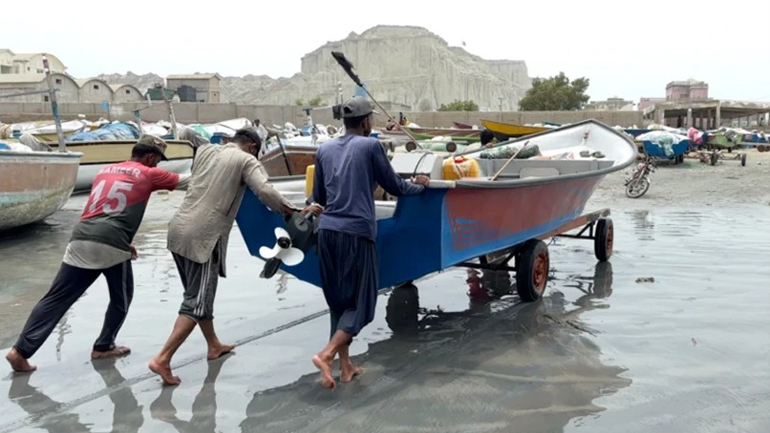
In Gwadar alone, 40,000 fishermen go to sea on launches and speedboats to fish on small and large boats.
Balochistan is Pakistan’s largest province by area, and due to its vast geography, private vehicles are the primary mode of transportation. The long distances also mean higher fuel consumption across the region. When we traveled from Gwadar to Turbat, a journey of about 150 kilometers, we noticed that the number of government or private fuel stations along the route was significantly lower compared to provinces like Sindh and Punjab. However, Iranian fuel is sold at several points along the way. If you travel from Zero Point on the RCD Highway to Gwadar via the Makran Coastal Highway, you’ll find only two petrol stations in Ormara claiming to sell fuel from Pakistani oil companies. Even in Gwadar, only two such stations exist. Yet, Iranian petrol is deeply linked to the local economy. It’s important to note that after the border fencing between Iran and Pakistan, Iranian fuel no longer enters the country from all routes. It is now typically transported via Zambad pickups from Jiwani or Kuntani, supporting the livelihoods of many locals involved in this trade.
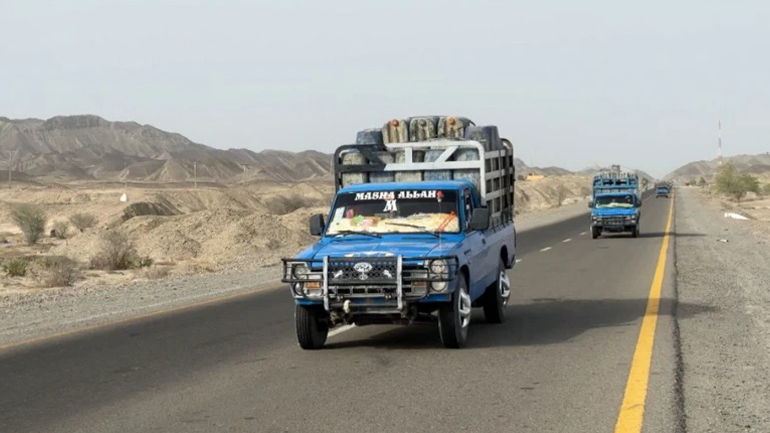
Oil is brought from Jiuni or Kantani on Zambad pickup trucks, which provides employment to many people.
“He sold his wife’s jewelry to buy a Zambad pickup truck,” says Bibarg, whom we met near Turbat. He was driving a vehicle loaded with diesel. Previously, he used to bring fuel from the Abdu border near Turbat, but that route is now completely shut down. He now has to collect fuel from the Jiwani or Kuntani areas. “Due to the war, border restrictions have increased. Business is not what it used to be. If the border trade runs, the kitchen runs — otherwise, I’ll have to borrow money,” he said. “This work is like gambling,” Bibarg added. “Sometimes you can earn 20,000 to 40,000 rupees. Sometimes, you lose just as much.” He has been in this line of work for the past four or five years, spending 10 to 12 hours on the road for each trip. Despite the challenges, he explains, “What else can I do? There’s no other source of income here.” As we turned off the main road towards Kuntani on a rugged, deserted track after the route to Jiwani, we occasionally saw pickup trucks loaded with jerry cans of Iranian diesel and petrol. Former Deputy Commissioner of Gwadar Abdul Kabir Zarkoon said that authorities on both sides are tightening controls to curb fuel smuggling, and he claimed the activity has “almost been eliminated.” He also mentioned plans to establish border markets in the frontier areas, allowing the legitimate exchange of goods between Pakistan and Iran.
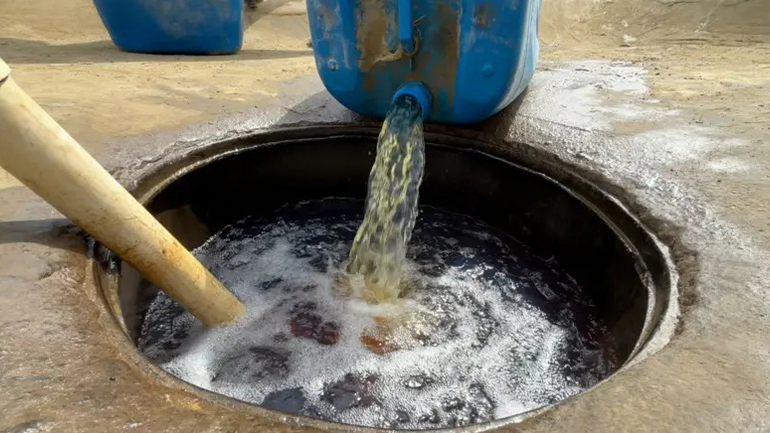
Residents reported that when restrictions tightened on transporting fuel via land routes, speedboats began to be used to bring in Iranian fuel. From the Makran coast to Taftan, Iran shares a 900-kilometer border with Pakistan’s Balochistan province. In Kuntani, we saw a large number of speedboats. However, local authorities classify this as "non-formal" trade. Specific tokens are issued, and only those with a token are permitted to transport fuel. In this way, the district administration regulates the trade. But this route has also been affected by the war. A depot manager in Kuntani told us: “Previously, three to four hundred launches would bring fuel from Iran, but now only a few remain.” According to him, “About 50% of the business has collapsed. Trade routes have been closed, and all border areas have been affected by this war.”
In the Iranian bazaar of Turbat, once known for the constant availability of goods from Iran, there is now a shortage. Where previously 200 to 300 pickup trucks would arrive daily, now only a handful are seen. Laborers are unemployed, and essential items are scarce, such as baby formula and flour. Meraj Dashti, a wholesale shopkeeper in the same market, explained: “The order I placed for goods from Iran is still pending. Factories in Tehran are either shut down or only operate in the evening, which is causing delays in supply and shortages in the market, including baby formula.” When asked why Pakistani products are sold in such limited quantities in the market, Meraj replied, “If a 200-gram Iranian biscuit costs 20 rupees, the same quantity of a Pakistani-made biscuit would cost around 100 rupees.” He added, “The quality, packaging, and shelf life of Iranian biscuits are better, which is why both customers and shopkeepers prefer Iranian goods.”
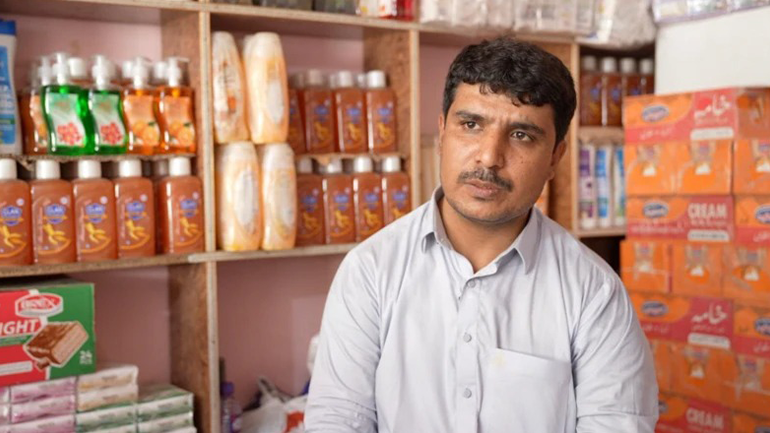
Meraj Dashti is a wholesale shopkeeper. He said that he still has no idea about the goods he ordered in Iran.
Even after the announcement of a ceasefire between Iran and Israel, local residents remain uncertain about when their lives will return to normal. Daily life in this region heavily depends on Iranian goods—whether it’s petrol and diesel, construction materials like cement and steel rods, or daily essentials like silk thread for embroidery, shampoo, detergents, milk, yogurt, and lassi. Most of these come from Iran. This cross-border trade isn’t just linked to the local population; it also connects to several cities in Sindh, including Larkana and Mirpur, as many people travel here solely for labor work. Muhammad Sudheer, a resident of Larkana, wore tattered clothes when. He said that previously he earned 2,000 to 3,000 rupees a day, allowing him to provide for both himself and his children. “Now,” he said, “there’s famine here and back home.” Rasool Bakhsh, from the Hathungo area of Mirpur Khas, had brought four young men from the Kohli community to find labor work during Eid. “Not only have we not found any work,” he said, “we don’t even have enough money to send these boys back home.” “In Sindh, the water has stopped, and here, the diesel supply has been cut off. Where should we go now? What should we do?”
Powered by Froala Editor